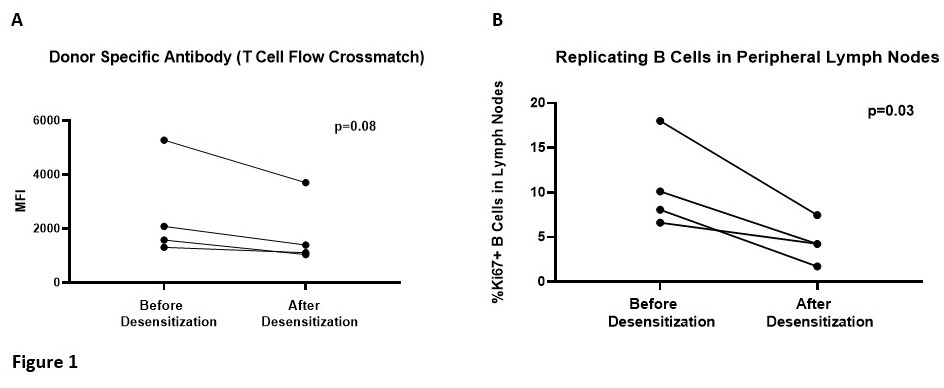Targeting the CD40/CD40L Axis in Sensitized Nonhuman Primate Allotransplantation
Duke University, Durham, NC
Meeting: 2020 American Transplant Congress
Abstract number: D-332
Keywords: Alloantibodies, B cells, Co-stimulation, Sensitization
Session Information
Session Name: Poster Session D: B-cell / Antibody /Autoimmunity
Session Type: Poster Session
Date: Saturday, May 30, 2020
Session Time: 3:15pm-4:00pm
 Presentation Time: 3:30pm-4:00pm
Presentation Time: 3:30pm-4:00pm
Location: Virtual
*Purpose: Blockade of the CD28/B7 costimulation pathway has shown great promise as part of desensitization and maintenance immunosuppression regimens in our sensitized nonhuman primate model. We hypothesized that blocking the CD40/CD40L axis would effectively desensitize highly sensitized nonhuman primates, and also that CD40 blockade-based maintenance immunosuppression would prolong graft survival in sensitized recipients after kidney transplantation.
*Methods: Rhesus macaques (n=4) were sensitized to maximally MHC-mismatched donors with two sequential skin transplants, then desensitized with an anti-CD40 agent (2C10R4, 20mg/kg weekly for 4 weeks) concurrent with a proteasome inhibitor (carfilzomib, 27mg/m2 weekly for four weeks). Two weeks after desensitization, animals underwent life-sustaining kidney transplants from their MHC-mismatched skin donors. Rhesus-specific antithymocyte globulin was used for induction. Maintenance immunosuppression consisted of an anti-CD40 agent (2C10R4), rapamycin, and methylprednisolone. Peripheral lymph nodes, peripheral blood, and bone marrow were analyzed throughout the study period.
*Results: Desensitization with anti-CD40 therapy and proteasome inhibition reduced donor-specific antibody (DSA, Figure 1A) and significantly reduced replicating B cells within lymph nodes (Figure 1B). Two primates have undergone kidney transplantation, with normal graft function 14 days after transplantation. The remaining primates will undergo scheduled kidney transplantation.
*Conclusions: Desensitization with CD40 blockade and proteasome inhibition effectively reduces DSA levels and lymph node B cell replication over a four-week period. Sensitized recipients to date have experienced normal graft function on anti-CD40-based maintenance immunosuppression. The CD40/CD40L axis deserves further study in the setting of sensitized recipients.
To cite this abstract in AMA style:
Fitch ZW, Schmitz R, Manook M, Choi AY, Yoon J, Kwun J, Knechtle SJ. Targeting the CD40/CD40L Axis in Sensitized Nonhuman Primate Allotransplantation [abstract]. Am J Transplant. 2020; 20 (suppl 3). https://atcmeetingabstracts.com/abstract/targeting-the-cd40-cd40l-axis-in-sensitized-nonhuman-primate-allotransplantation/. Accessed February 19, 2026.« Back to 2020 American Transplant Congress

